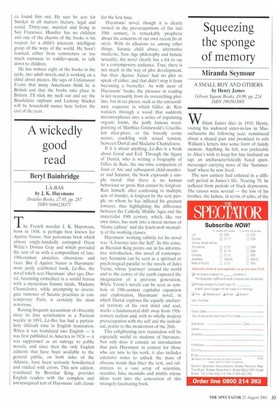A wickedly good read
Beryl Bainbridge
LA-BAS by J. K. Huysmans
Dedalus Books, f7.95, pp. 287 ISBN 0486228371
The French novelist J. K. Huysmans, born in 1848, is perhaps best known for Against Nature, that poisonous book which almost single-handedly corrupted Oscar Wilde's Dorian Gray and which provided the rest of us with a compendium of late19th-century anxieties, obsessions and vices. But if Against Nature is Huysmans' most justly celebrated book, La-Bas, the novel which sees Huysmans' alter ego, Durtal. becoming enmeshed in a sordid liaison with a mysterious femme fatale, Madame Chantelouve, while attempting to investigate rumours of Satanic practices in contemporary Paris. is certainly his most notorious.
Raising frequent accusations of obscenity since its first serialisation in a Parisian weekly in 1891, La-Bas has had a particularly difficult time in English translation. When it was translated into English — it was first published in America in 1924 — it was suppressed as an outrage to public morals, and since then the only English editions that have been available to the general public, on both sides of the Atlantic, have been seriously bowdlerised and riddled with errors. This new edition, translated by Brendan King, provides English readers with the complete and unexpurgated text of Huysmans' cult classic for the first time.
Huysmans' novel, though it is clearly rooted in the preoccupations of the late 19th century, is remarkably prophetic about the concerns of our own recent fin de siècle. With its allusions to, among other things. Satanic child abuse, alternative medicine, New Age philosophy and female sexuality, the novel clearly has a lot to say to a contemporary audience. True, there is not much in the way of plot development, but then Against Nature had no plot to speak of either, and that didn't stop it from becoming a bestseller. As with most of Huysmans' books, the pleasure in reading is not necessarily from its overarching plotline, but in set pieces, such as the extraordinary sequence in which Gilles de Rais wanders through a wood that suddenly metamorphoses into a series of copulating organic forms, the justly famous wordpainting of Matthias GrOnewald's Crucifixion altar-piece, or the brutally erotic scenes, crackling with sexual tension, between Durtal and Madame Chantelouve.
If it is about anything, La-Bas is a book about Good and Evil. Through the figure of Durtal, who is writing a biography of Gilles de Rais, the one-time companion of Joan of Arc and subsequent child-murderer and Satanist, the book expounds a simple moral: that there is no human behaviour so gross that cannot be forgiven. Rais himself, after confessing to multiple acts of murder, is forgiven by the very people on whom he has inflicted his greatest tortures, thus highlighting the difference between the Catholic Middle Ages and the materialist 19th century, which, like our own times, has sunk into a moral morass of 'blame culture' and the lynch-mob mentality of the working classes.
Huysmans' working subtitle for his novel was 'A Journey into the Self'. In this sense, as Brendan King points out in his informative introduction, this novel of contemporary Satanism can be seen as a spiritual or psychological parallel to the novels of Jules Verne, whose 'journeys' around the world and to the centre of the earth captured the imagination of a previous generation. While Verne's novels can be seen as symbols of 19th-century capitalist expansion and exploitation, Huysmans' novel, in which Durtal explores the equally uncharted territory of his own mind and soul, marks a fundamental shift away from 19thcentury realism and, with its wholly modern preoccupation with the self and the individual, points to the modernism of the 20th.
This enlightening new translation will be especially useful to students of literature. Not only does it contain an introduction that puts Huysmans in context for those who are new to his work, it also includes extensive notes to unlock the mass of obscure words that litter the text, and references to a vast array of scientists, occultist, false messiahs and misfits whose ideas went into the concoction of this strangely fascinating book.


























































 Previous page
Previous page